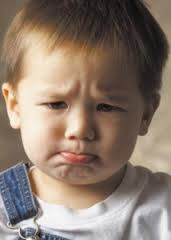记忆方法
【记法】分解为:fr(肥肉)+own(自己的),自己身上的肥肉
【联想】谁看到自己身上长满了肥肉都会皱眉头
2. brow => *frow- + n (象形,两边眉毛皱在一起形成挤压的皱纹的样子) => frown.
【联想】谁看到自己身上长满了肥肉都会皱眉头
2. brow => *frow- + n (象形,两边眉毛皱在一起形成挤压的皱纹的样子) => frown.
中文词源
frown 皱眉
来自古法语frognier, 皱眉,哼鼻子。可能来自拟声词,模仿哼鼻子的声音,表达不满。引申词义皱眉。
英语词源
- frown
-
frown: [14] Probably the underlying notion of frowning is ‘snorting’ rather than ‘wrinkling the brows’. It comes from Old French froignier, which meant ‘snort’ as well as ‘frown’. It is assumed to have been adopted into French from a Celtic language of Gaul, and would therefore have been related to Welsh ffroen ‘nostril’.
- frown (v.)
- "contract the brows as an expression of displeasure," late 14c., from Old French frognier "to frown or scowl, snort, turn up one's nose" (preserved in Modern French refrogner), related to froigne "scowling look," probably from Gaulish *frogna "nostril" (compare Welsh ffroen "nose"), with a sense of "snort," or perhaps "haughty grimace." Figurative transitive sense "look with displeasure" is from 1570s. Related: Frowned; frowning.
- frown (n.)
- 1580s, from frown (v.).
权威例句
- 1. The smile disappeared to be replaced by a doleful frown.
- 笑容消失了,取而代之的是哀伤的蹙眉。
- 2. There was a deep frown on the boy's face.
- 男孩眉头紧锁.
- 3. Billy's eyebrows knitted together in a little frown.
- 比利眉头微皱。
- 4. His forehead knotted in a frown.
- 他眉头紧锁。
- 5. A frown formed between her arched brows.
- 她皱起两道弯眉。

